

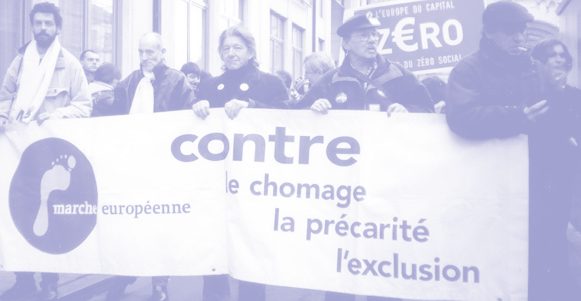 |
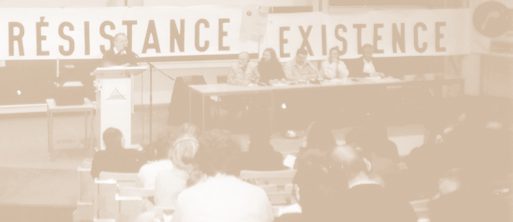 |
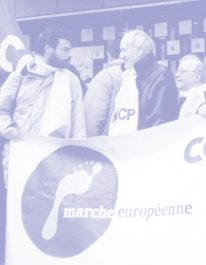 |
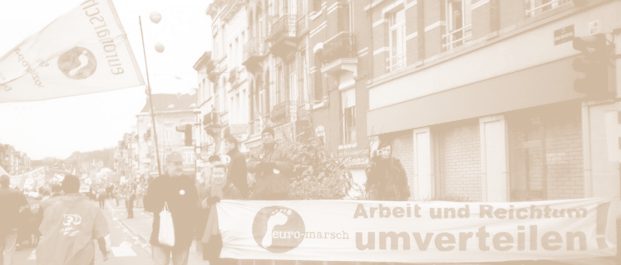 |
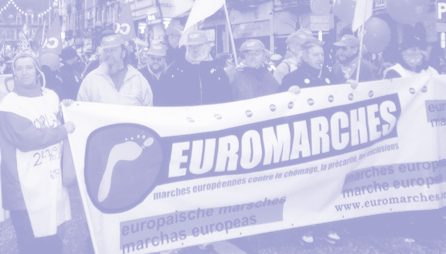 | ||
European Marches
|
||||||||||||||
| ||||||||||||||
What in the future? |
||||||||||||||
Seven burning issues which are conditioning prospectsSynthesis of the speeches which followed the round table and the working groups (Jean-Guy Dufour) E.U. Enlargement: how can our hopes overcome our fears?An interesting experience of common knowledge has been developed between German unemployed organizations and Polish's ones through selective initiatives and the development of informal relations. All think it is necessary to develop this movement, specifically around practical projects. It is also useful to take the most of official initiatives of exchanges and cooperation as the Euroregion of Pomerania. Such a cooperation not only enable to help one another but also to better know each other, to better understand the situation of each one and thus to better struggle against xenophobic reactions that might expand. This cooperation enable thus to make rise together the demand for the same high level rights in the East as in the West. Indeed, we know that great fears exist among the populations, in the East as in the West, about the consequences of the enlargement. In the East, there is a fear of the disappearance of entire sectors of activity which have too much to catch up, in the West, the fear of the competition of eastern workers who make do with a very little, of the loss of European subsidies to be shared with new countries without any increase of the total amount, of delocalizations of activities from the West to the East. Are these fears justified? It is very difficult to say so now and we will have to observe very closely the evolution of the situation. But what is sure is that the European economic and social policies produce unemployment and precariousness and these policies might make the enlargement dangerous for people, not the enlargement in itself which, on the contrary increases the possibilities for Europe to pursue another way than the one of liberal globalization by reinforcing its economic self-sufficiency. There is then only one parry: to act in order to gain indivisible rights in the East as in the West of E.U. and a recognized citizenship with no differences between those who live in its soil, regardless their origin. Wages and guaranteed minimum income? How? What level?The 2010 agenda of the German government means that thousands of workers – above all women – will have to accept wages that are lower than the minimum provided under the collective labour agreements. In the fields of cleaning, hotel business, gross salaries fluctuate already between 944 euros and 1380 euros a month. So, the demand of a minimum wage, until now non-existent in Germany, is growing. Thus the food union claims a gross minimum wage worth 1500 euros a month. The services union Verdi wants to develop the struggle against workfare for unemployed. On the contrary, IG Metall, representative of a sector in which the balance of power is better, fears that the institution of a minimum wage makes wages lower and that the contractual system that makes the strength of German trade unions suffer from such measures. Here is the importance of the demand for a high enough minimum wage. The idea to propose the Agenda 30-10 in oppositions of the 2010 Agenda is spreading: 30 hours a week for 10 euros an hour at the minimum. In all the countries, the discussion on the minimum wage level is related to the one of a guaranteed minimum income for the unemployed. Everywhere, employment policy drives the tendency to lower these minimum standards and opposed to that, positions are very different. Is a difference between the minimum wage and the minimum income necessary? Should we index them to the GDP or to the average wage? Should we envisage a daily minimum wage calculated from a set of goods which would be guaranteed in whatever period we live; with or without a job, as think the entertainment workers in France? At the moment, the Euromarches demand a guaranteed minimum income equal to 50% of GDP per inhabitant and, in its principle at any rate, this demand is quite consensual. In spite of that, we must enter in a deep discussion derived from specific knowledge about the way the minimum wage is calculated in each country. Without the recognition of residence citizenship for men and women living in Europe, whatever their origin, we are all weakened in the struggle for our rightsThe working group on immigration made a clear statement on the most frequent tragic situations of migrants in the current E.U., be they native from Eastern Europe or from elsewhere. This situation allows a great deal of employers to hire them legally or illegally, at low costs, putting thus a great pressure to lower wages in a lot of sectors of activity (shipyard, building trade, farming, etc.). It is the necessary for all to obtain immediately from E.U. and from member states the right to regularization of all immigrants and the closing of detention centres. Beyond, the recognition of the residence citizenship giving the same rights to the residents on the E.U. soil, whatever their nationality, is a demand shared by all the movements members of the Network for a democratic and social Europe. The crucial choice for Europe: the economy must serve the rights and not the other way round!The issues raised by the working group on « social rights, citizenship and constitutional issues » are of utmost importance. The European construction will be able to lead to the adhesion of people only if it means that the economy serves the real progress of social rights meanwhile today, we notice the opposite in most countries. The cooperation between trade unions, unemployed organizations and social movements must improveUsually, this cooperation is at the present time very insufficient. From this point of view, we can note two contrasting situations. In Germany, the success of the demonstration against the 2010 Agenda of the red/greens governmental coalition, which was organized in November 2003 together with trade unions and organizations of the Alter-globalization movement deeply changed the relations between trade unions and the social movement. The 3rd of April, demonstrations will be very important and unemployed organizations will express themselves. The trade union Verdi is giving a more and more significant place to unemployed and demands around the minimum income or the minimum wage progress inside trade unions. In Poland, on the contrary, the situation is disastrous from that point of view. Trade unions, which still exist merely in State services, ignore completely the unemployed and their demands except when it comes to be present in demonstrations. In France, the CFDT implements jointly with the employers very hard attacks against the unemployed. A big effort of giving people information on the stakes of the European Constitution is a must: only the people can decide on the ConstitutionThis is a unanimous assessment: the people know absolutely nothing about these stakes. It is catastrophic when we are aware of what the consequences of the fact of having set in stone the current social policy direction may be. We have to use all possible means to change this situation: a large diffusion of very simple material, and of initiatives; for instance, on the occasion of the May day, or else the initiative of the Spanish Consulta, or of action days. Every time we inform, it is important to spread our alternative counter-proposals. Beyond the information, we have to insist on the demand that the people must be consulted in the frame of a referendum. Whatever the analyses made on the Constitution, it is unacceptable for any democrat to see this Constitution not submitted to the European people to decide. Around this demand, all democratic parties and all the organizations of the social movement have to be able to unite. Working on the development of a European social movementFor the Euromarches, one of the essential characteristic of the European social movement is that it has to demand an open Europe not participating in the domination and exploitation of other countries but, on the contrary, establishing fair cooperation with them. We have to note that social movements, both in associations and trade unions, do not manage at the present time to make an efficient European coordination grow, with forces likely to oppose the social policy of the current Europe. Consequently, the replies to these attacks only exist by country, in scattered formation, depending on each country's agenda according to the directions decided by states on the European scale, as for example the issue of pensions. It is therefore essential to promote means to make social movements more effective. There will be no construction « from the top » of a European social movement: the social movement works through practical initiatives and through the organization of real international social struggles as well as through the increase in the number of horizontal links between grassroots activist and collectives acting in several countries, associative activists, unionists, activist from the alternative and alter globalisation movements... We have contributed to that since 1997, modestly, although in advance of many others, with the organization of the first European marches against unemployment, job insecurity and exclusion. These marches symbolically started in Tangier and Sarajevo. We feel happy to see that these mobilizations have taken a more international course these last years. The « March » to come is the one which will lead us to a world without any borders, a world of freedom and social justice. We are drawing the lines of this March, it will take the form we give to it, all of us together ! |
E.U. Enlargement: how can our hopes overcome our fears? Wages and guaranteed minimum income? How? What level? The crucial choice for Europe: the economy must serve the rights and not the other way round! The cooperation between trade unions, unemployed organizations and social movements must improve |
|||||||||||||
|
<< Common social rights to every resident in the European Union << Women and precariousness in Spain << A European and misogynistic constitutional treaty which usurps women's conquests << LISBON AGENDA: More and Better Jobs? 
02/08/04
|
||||||||||||||